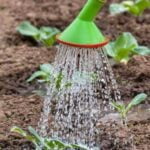When it comes to maintaining a healthy vegetable garden, weed control is an essential aspect that should not be overlooked. Weeds compete with your vegetables for essential nutrients, water, and space, ultimately hindering their growth and productivity. To tackle this issue effectively, many gardeners turn to weed killers as a solution. However, before grabbing that bottle of herbicide from the shelf, it’s crucial to understand the potential risks and hazards associated with using such chemicals in your vegetable garden.
Vegetable gardens are unique ecosystems that require careful consideration when choosing any products or methods for weed control. It’s important to prioritize the health and safety of both your plants and yourself. This article will explore whether or not weed killers are safe for use in vegetable gardens. We will delve into different types of weed killers available in the market, examine their potential risks and hazards, and discuss how to make informed decisions regarding their use.
While traditional chemical weed killers may seem like a quick fix for eliminating weeds in your vegetable garden, they come with certain concerns. These concerns include potential contamination of soil and groundwater, as well as toxic residue on vegetables that could negatively impact human health.
Therefore, it becomes necessary to carefully evaluate the safety factors associated with these products before using them in your precious garden. Additionally, we will also look at alternative options such as eco-friendly and organic methods that can effectively control weeds while minimizing harm to the environment.
By gaining a comprehensive understanding of the importance of weed control in vegetable gardens and examining the potential risks associated with using weed killers, you can make informed decisions for maintaining a healthy and productive garden all year round. In subsequent sections of this article, we will delve deeper into each aspect mentioned above to provide you with valuable insights into achieving effective weed control without compromising the safety of your vegetable garden.
Different types of weed killers available in the market
Weed killers, also known as herbicides, are a popular option for controlling weeds in vegetable gardens. There are several different types of weed killers available on the market, each with its own unique properties and methods of action. Understanding the different types can help gardeners make informed decisions about which weed killer is best suited for their needs.
One common type of weed killer is pre-emergent herbicides. These weed killers work by preventing the growth of weed seeds before they even sprout. They create a barrier in the soil that inhibits the germination process, effectively controlling weeds from the start. Pre-emergent herbicides are typically applied before planting vegetables or in early spring to establish a weed-free garden bed.
Another type of weed killer is post-emergent herbicides. This type is used to control existing weeds that have already emerged in the garden. Post-emergent herbicides target specific types of weeds and work by either directly killing them or inhibiting their growth. They can be further classified into selective and non-selective herbicides. Selective post-emergents only target specific types of weeds, while non-selective herbicides kill any plant they come into contact with.
Some other commonly used types include systemic herbicides, which are absorbed by plants and move through their vascular system to kill both leaves and roots, and contact herbicides, which only affect the parts of plants that they come into contact with.
It is important to note that while weed killers can be effective in controlling weeds in vegetable gardens, it is crucial to choose the right type based on personal needs and preferences, as well as following proper usage guidelines provided on product labels to minimize risks and ensure safety.
Exploring the potential risks and hazards associated with using weed killers in vegetable gardens
Weed killers are commonly used in vegetable gardens to effectively control and eliminate unwanted plants. However, it is important for gardeners to understand the potential risks and hazards that may be associated with using these chemicals. This section will explore the possible dangers of using weed killers in vegetable gardens, providing useful information for gardeners to make informed decisions regarding their use.
One potential risk of using weed killers in vegetable gardens is the possibility of chemical residues on the crops. When a weed killer is sprayed or applied near vegetables, there is a chance that some of the chemicals may come into contact with the plants.
These residues can be harmful if consumed by humans and may even have long-term health effects. It is crucial for gardeners to carefully read and follow the instructions provided by the manufacturer to minimize this risk.
Another hazard to consider is the impact of weed killers on beneficial organisms in the garden. While weed killers are designed to target specific plants, they can also harm other organisms such as beneficial insects, birds, and even humans themselves.
Some weed killers contain toxic ingredients that can have detrimental effects on these creatures when ingested or exposed to them in any way. This highlights the importance of choosing a weed killer that is specifically labeled as safe for use around vegetables.
Additionally, environmental pollution is another concern when using certain types of weed killers in vegetable gardens. Some chemical-based products can leach into the soil or runoff into nearby water sources, causing contamination and damage to ecosystems beyond your own garden. It is essential to consider the environmental impact before deciding to use a particular weed killer and opting for more eco-friendly alternatives whenever possible.
To mitigate these risks and hazards associated with using weed killers in vegetable gardens, it is vital for gardeners to conduct thorough research and choose appropriate products based on their specific needs and concerns. Considering factors such as toxicity levels, target pests, application methods, and timing can help ensure safer usage practices. Moreover, proper storage, handling, and disposal of weed killer products are equally important to prevent accidents or contamination.
By understanding the potential risks and hazards associated with using weed killers in vegetable gardens, gardeners can take necessary precautions to minimize these dangers. It is crucial to weigh the benefits against the potential harms before deciding to use a particular weed killer. In the next section, we will explore alternative methods and eco-friendly approaches to weed control that can be implemented in vegetable gardens, reducing reliance on chemical-based products.
Understanding the different factors to consider when choosing a weed killer for your vegetable garden
When it comes to choosing a weed killer for your vegetable garden, there are several important factors to consider. Selecting the right weed killer is crucial to ensure the safety of your plants and the overall health of your garden. Here are some key factors to keep in mind when making your decision:
- Type of weeds: Different weed killers may be more effective at targeting specific types of weeds. It’s important to identify the types of weeds you are dealing with in your vegetable garden and choose a weed killer that is proven to be effective against those particular weeds.
- Mode of action: Weed killers can work through various modes of action, such as inhibiting photosynthesis or disrupting cell growth. Some weed killers may have residual effects, while others may only have contact effects. Understanding the mode of action of a weed killer can help you determine how it will affect your vegetables and how long you need to wait before harvesting.
- Safety for edible crops: One crucial factor to consider is whether the weed killer is safe for use on edible crops. Look for herbicides that have been specifically approved for use in vegetable gardens and have clear instructions regarding pre-harvest intervals (PHI), which indicate how long you need to wait after application before it is safe to harvest and consume your vegetables.
| Name | Type of Weeds | Mode of Action | Safety for Edible Crops |
|---|---|---|---|
| WeedKiller A | Broadleaf, grasses | Inhibits photosynthesis | Safe with 7-day PHI |
| WeedKiller B | Grasses | Disrupts cell growth | Safe with 14-day PHI |
| WeedKiller C | Broadleaf, grasses | Contact effect | Safe with 3-day PHI |
Keep in mind that this table is just a general comparison and it’s important to thoroughly read the labels and instructions of any weed killer you are considering. Additionally, consider consulting with an expert or your local agricultural extension office to ensure you are making the best choice for your specific vegetable garden. By carefully considering these factors, you can choose a weed killer that effectively targets weeds while still ensuring the safety of your vegetables.
Safe alternatives to traditional chemical weed killers for vegetable gardens
When it comes to weed control in vegetable gardens, many gardeners are concerned about the potential risks and hazards associated with using traditional chemical weed killers. Fortunately, there are safe alternatives available that can effectively control weeds without compromising the health of your plants or the environment.
One safe alternative to chemical weed killers is manual or mechanical weed control. This method involves physically removing weeds from your vegetable garden by hand or using gardening tools such as hoes or cultivators. It may require more effort and time compared to using chemical sprays, but it is a safer option that does not introduce harmful chemicals into your garden.
Another alternative is mulching, which involves covering the soil around your vegetable plants with organic materials such as straw, wood chips, or grass clippings. Mulch acts as a barrier, preventing sunlight from reaching weed seeds and inhibiting their growth. Additionally, mulch helps retain moisture in the soil and regulates temperature, benefiting the overall health of your vegetable plants.
Crop rotation is another effective technique for weed control in vegetable gardens. By rotating your crops each year, you can disrupt the life cycles of many common weeds. Rotating crops also helps prevent nutrient depletion in the soil and reduces the risk of disease and pest buildup.
Exploring eco-friendly and organic weed control methods for vegetable gardens
Eco-Friendly Weed Control Methods
When it comes to maintaining a healthy and productive vegetable garden, many gardeners prefer to use eco-friendly and organic weed control methods. These methods not only help keep the garden free from unwanted weeds but also minimize the potential risks associated with traditional chemical weed killers. Here are some effective eco-friendly weed control methods for vegetable gardens:
- Mulching: Mulching is an excellent method for preventing weeds from growing in your vegetable garden. Organic mulch such as straw, wood chips, or compost can be spread around the plants to create a barrier that inhibits weed growth. Additionally, mulch helps retain soil moisture and regulate temperature fluctuations.
- Hand-pulling: Manual removal of weeds is a labor-intensive but highly effective method, particularly for smaller gardens. Regularly inspecting your garden and pulling out weeds by hand before they have a chance to spread their seeds can prevent them from taking over.
- Companion planting: Certain plants release natural substances that inhibit the growth of weeds. By interplanting compatible vegetables or herbs, you can naturally suppress weed growth in your vegetable garden. For example, planting marigolds around your tomatoes can deter weed growth due to their natural herbicidal properties.
Organic Weed Control Methods
Organic weed control methods rely on natural products and practices that do not harm the environment or human health. Here are some commonly used organic weed control methods for vegetable gardens:
- Vinegar-based herbicides: Vinegar contains acetic acid which can be an effective organic herbicide when applied directly to the leaves of weeds. However, it is important to note that vinegar-based herbicides may also affect desirable plants if not used carefully.
- Boiling water: Pouring boiling water directly onto weeds can cause thermal shock and kill them effectively without leaving any harmful residues behind.
- Homemade weed sprays: A mixture of natural ingredients such as soap, salt, and vinegar can be combined to create a homemade weed spray. This spray can be used to directly target weeds and kill them without the use of harmful chemicals.
By utilizing these eco-friendly and organic weed control methods, you can effectively manage weeds in your vegetable garden while promoting a healthy and sustainable environment.
Conducting a risk assessment
When it comes to using weed killers in vegetable gardens, one of the most crucial steps is conducting a thorough risk assessment to ensure the safety of both your crops and the environment. This process involves evaluating different factors and considerations specific to your garden’s unique needs. By following a step-by-step guide, you can determine whether a particular weed killer is suitable for your specific vegetable garden.
Evaluating Garden Characteristics
The first step in conducting a risk assessment is evaluating the characteristics of your vegetable garden. Take into account factors such as soil type, plant species, and drainage patterns. Some weed killers may have adverse effects on certain plants or degrade the quality of soil over time. Determine whether any special precautions need to be taken based on the specific conditions of your garden.
Assessing Potential Risks
Once you have evaluated your garden’s characteristics, it’s important to assess potential risks associated with using weed killers. Consider whether there are nearby water sources that could be contaminated by the herbicide runoff or if there are beneficial insects or wildlife that could be affected. Take note of any potential risks to ensure proper precautions are taken during and after application.
Reading Labels and Conducting Research
Before purchasing a weed killer for your vegetable garden, thoroughly read product labels and conduct research on its safety profile. Look for keywords like “safe for use in vegetable gardens” or “organic” to find products that pose minimal risks to humans and the environment. Additionally, research user reviews or consult with professionals in the field who can provide guidance on which herbicides are best suited for vegetable gardens.
By conducting a thorough risk assessment specific to your vegetable garden’s needs and researching various options available in the market, you can make an informed decision when choosing a weed killer that balances effectiveness with safety considerations. Remember that regular monitoring and careful application techniques will play a critical role in minimizing risks associated with weed killers and ensuring a healthy vegetable garden.
Step-by-step guide on properly using weed killers in vegetable gardens to minimize risks
When it comes to using weed killers in vegetable gardens, it is important to follow proper practices to ensure the safety of your plants and yourself. Here is a step-by-step guide on how to use weed killers in vegetable gardens while minimizing the associated risks.
- Read and follow the label instructions: Before using any type of weed killer, carefully read and understand the label instructions. Each product may have different usage directions, so it is crucial to follow them accurately. Pay attention to application rates, safety precautions, and recommended waiting periods before harvesting vegetables.
- Choose the right time for application: Timing is key when applying weed killers in vegetable gardens. Ideally, apply herbicides on a calm day with little to no wind. This will prevent the herbicide from drifting onto desirable plants or areas where it can cause harm. Additionally, consider applying the weed killer when rain is not anticipated for at least 24 hours to allow sufficient time for absorption.
- Use targeted application methods: To minimize the risk of damaging vegetables, use targeted application methods such as spot spraying or using a shielded sprayer. Spot spraying involves directly applying the herbicide only on weeds while avoiding contact with nearby vegetables. A shielded sprayer creates a physical barrier between the spray nozzle and surrounding plants, preventing accidental herbicide contact.
- Take proper safety precautions: When handling and applying weed killers in vegetable gardens, always prioritize safety measures. Wear protective clothing, including gloves, long-sleeved shirts, long pants, closed-toe shoes, and eye protection to avoid direct contact with the herbicide solution. Additionally, make sure to wash your hands thoroughly after handling any chemicals.
By following these steps and adhering to best practices when using weed killers in vegetable gardens, you can minimize risks while effectively controlling weeds without harming your precious produce.
Tips for maintaining a weed-free vegetable garden without the use of harmful weed killers
One of the main concerns when it comes to using weed killers in vegetable gardens is the potential risks and hazards they may pose to our health and the environment. While weed control is important for maintaining a healthy garden, there are alternatives to traditional chemical weed killers that can help us achieve a weed-free vegetable garden without compromising safety.
One safe and effective method for maintaining a weed-free vegetable garden is through manual removal. Regularly inspecting your garden and manually pulling out weeds by hand or using handheld tools can be an efficient way to keep them under control.
It is important to pull weeds from the root to prevent them from regrowing, and it’s recommended to do this on a sunny day when the soil is dry so that it’s easier to extract the entire plant.
Mulching is another great technique for preventing weeds from taking over your vegetable garden. Applying a layer of organic mulch, such as straw, wood chips, or grass clippings, around your plants helps smother existing weeds and prevents new ones from sprouting. Additionally, mulch helps retain moisture in the soil and regulates temperature, providing optimal growing conditions for your vegetables.
Crop rotation is not only beneficial for improving soil fertility but also aids in weed control. The practice involves planting different types of crops in different areas of your garden each year, which disrupts the lifecycle of specific weeds as they rely on certain host plants. By rotating crops annually, you can minimize weed problems as well as reduce pest and disease issues.
By utilizing manual removal, mulching, and crop rotation techniques in combination with regular maintenance practices like proper watering and fertilizing schedules, you can maintain a healthy and weed-free vegetable garden without the use of harmful weed killers. These methods not only provide safer alternatives but also contribute to an environmentally friendly approach that promotes sustainability in our gardens.
Conclusion
In conclusion, the use of weed killers in vegetable gardens is a topic that requires careful consideration. While weed control is essential for the health and productivity of your garden, it is important to understand the potential risks and hazards associated with these products. By weighing the pros and cons, you can make informed decisions that prioritize both the safety of your plants and your own personal well-being.
One of the key factors to consider when choosing a weed killer for your vegetable garden is its impact on the environment. Traditional chemical weed killers may contain harmful substances that can leach into the soil or contaminate water sources. However, there are safe alternatives available, such as organic or eco-friendly options. These products utilize natural ingredients that effectively control weeds without compromising the health of your garden or contributing to pollution.
Another important consideration is conducting a risk assessment specific to your vegetable garden. Factors such as the type of crops you are growing, proximity to water sources, and presence of children or pets should be taken into account before using any weed killer. By understanding these variables and reading product labels carefully, you can choose a weed killer that minimizes potential risks and hazards.
Ultimately, maintaining a weed-free vegetable garden without relying on harmful weed killers is possible. Regular cultivation, mulching, and hand-pulling are effective techniques for controlling weeds naturally. Additionally, implementing proper irrigation practices and providing adequate nutrients to strengthen your vegetables can help suppress weed growth.
In summary, although weed control in vegetable gardens is necessary for optimal plant growth and yield, it is crucial to consider the potential risks and benefits associated with using weed killers. By considering eco-friendly alternatives, conducting individual risk assessments, and utilizing natural control methods whenever possible, you can maintain a healthy vegetable garden while minimizing harm to yourself and the environment.
Frequently Asked Questions
What weed killer can you use around vegetables?
When it comes to using weed killers around vegetables, it is crucial to choose products specifically formulated for this purpose. One common option is organic herbicides that contain ingredients like acetic acid (vinegar) or pelargonic acid (derived from plants).
These natural weed killers are effective in targeting broadleaf weeds while being safe for vegetable plants when used as directed. It’s important to carefully read and follow the instructions on the label to ensure proper application and avoid any potential harm to your vegetables.
How do I kill weeds in my garden without killing vegetables?
Killing weeds in your garden without harming your vegetable plants requires a combination of manual weed removal methods and proactive weed control measures. Hand-pulling weeds regularly is an effective way to tackle them without impacting the vegetables. By removing the weeds manually, you can prevent them from competing for essential nutrients and water with your vegetable plants.
Additionally, mulching around your vegetables helps suppress weed growth by blocking sunlight access, inhibiting their germination and growth. Applying a layer of organic mulch can make a significant difference in preventing new weeds from sprouting while providing other benefits like moisture retention and temperature regulation.
Is there a weed killer that doesn t kill vegetable plants?
Yes, there are several weed killers available on the market that won’t harm vegetable plants if used correctly. Glyphosate-based herbicides, such as Roundup, can be used around vegetable plants after they have matured or have been harvested for the season since these chemicals break down quickly in soil and do not leave long-lasting residue.
Additionally, pre-emergent herbicides can help prevent weed seeds from germinating without affecting established vegetable plants. However, always exercise caution when using any chemical herbicide near edible crops and closely follow all instructions provided by the manufacturer to minimize any risks associated with these products.

If you’re looking to get into vegetable gardening, or are just looking for some tips on how to make your current garden better, then you’ve come to the right place! My name is Ethel and I have been gardening for years. In this blog, I’m going to share with you some of my best tips on how to create a successful vegetable garden.





